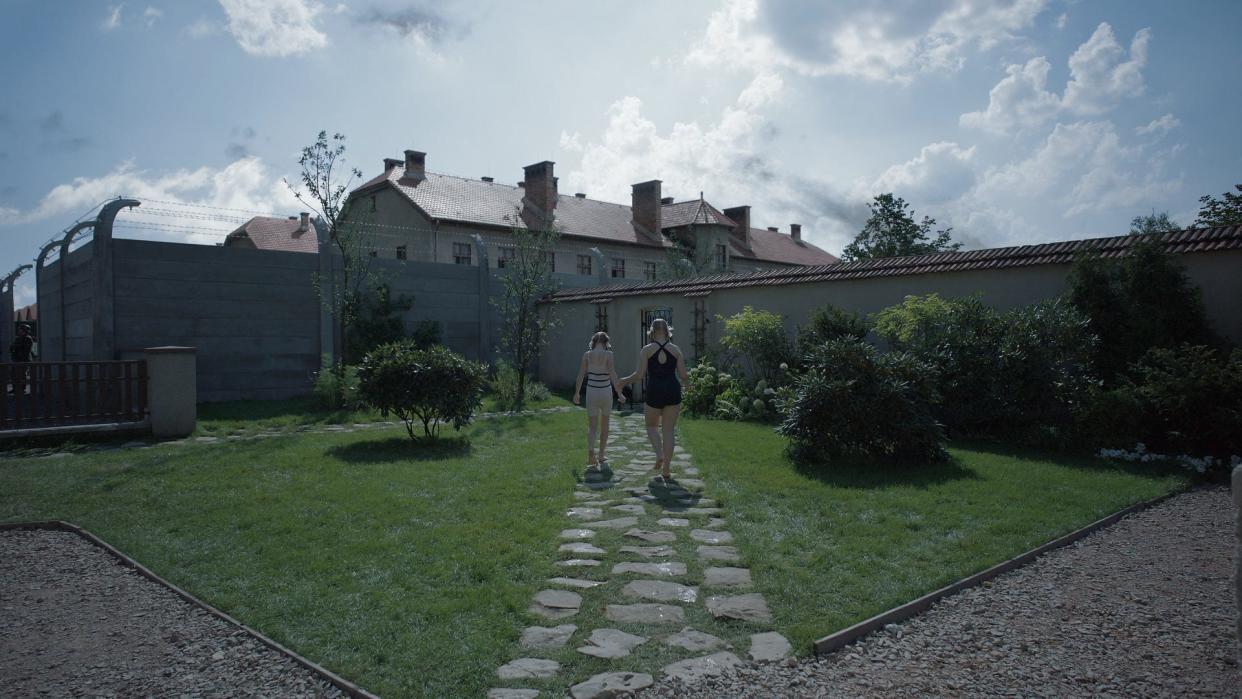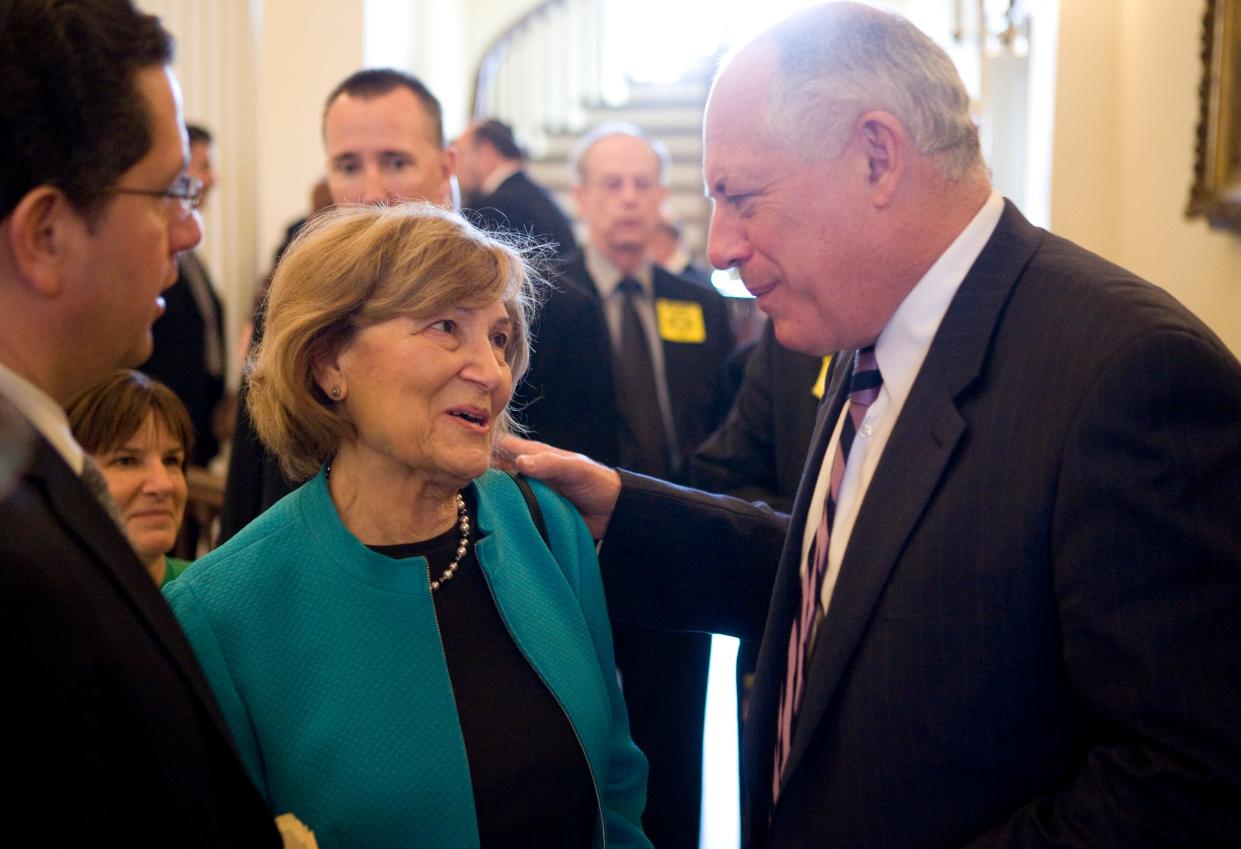Nazis marched in Nashville. Blame a growing collective ignorance that we must reverse
Oscar-nominated movie “The Zone of Interest” is a horror movie and a public accusation.
This is a different type of Holocaust movie where the audience never sees the torture or death of the victims.
Instead, viewers watch scenes of a Nazi family enjoying nature and parties while they ignore the screams of gas chamber victims across the wall in the Auschwitz concentration camp in Poland.
We the audience are also made to feel complicit. That is the sense I received when I saw the film a few weeks ago at the Belcourt Theatre in Nashville.
In some ways, it makes the drama more horrific to witness this great level of indifference.
On Saturday, Nazis marched through downtown Nashville, went to Public Square and stood at the Tennessee State Capitol waving flags with the swastika logo, causing a barrage of condemnation from politicians and community leaders from both left and right.
That condemnation is important, but simply telling Nazis to "go away" is not enough. There needs to be a collective understanding about what Nazi-ism is all about and why it is bad for America.
Go away Nazi thugs. This is Tennessee and you are NOT welcome here. Btw, why not show your faces so we can all see who you are? I would be willing to bet that none of you are from anywhere near here. https://t.co/OGOCKKJbw1
— William Lamberth (@WilliamLamberth) February 17, 2024
Another view: Educators must equip students to confront rising tide of antisemitism
Holocaust education is severely lacking
One of the biggest lessons from “The Zone of Interest” is how apathy and ignorance can lead to the erasure of a human being’s culture, identity and right to exist.

The calls for citizens to “never forget” and to “never again” allow this atrocity to happen requires that citizens confront an awful history.
This political philosophy resulted in genocide and the subjugation of people who Nazis considered ethnically and racially inferior. The United States and its allies fought a bloody war to destroy this threat.
Yet here we are in 2024 and Nazis proudly paraded through Tennessee’s state capital – nearly 80 years after the end of World War II.
Do these people know what they are doing and what Nazi symbols really mean? If they do, that is clearly antithetical to our stated values of peaceful protest and treating citizens as equals.
In 2020, a 50-state survey by the Jewish Material Claims Against Germany found the alarming statistic that 63% of Millennials and Gen Zers did not know that 6 million Jewish people were murdered during the Holocaust.
I have written in the past about the need to increase Holocaust education in Tennessee.
But the state is going backwards in our approach by seeking to avoid exposing school children to ideas that may make them feel uncomfortable.
In 2022, the McMinn County School Board received global condemnation for removing the Pulitzer Prize-winning Holocaust graphic novel “Maus” from the eighth grade curriculum. Recent laws in Tennessee banning so-called “divisive concepts” have had a chilling effect of purging books from school libraries and changing the ways teachers instruct their students to avoid some lessons altogether.
The primary victims of the Holocaust were Jewish. However, there were also others including people with disabilities, ethnic minorities such as the Roma, and LGBTQ people who also deserve dignity and respect. On the latter, the Tennessee General Assembly has created a legal environment that is increasingly hostile to LGBTQ people.
The First Amendment protects even vile speech
The Constitution protects the rights of Nazis. The marchers in Nashville were not arrested for their protest because of the First Amendment, which ensures Americans may speak and assemble freely.
In the late 1970s, members of the Nazi Party wanted to hold a march in Skokie, Illinois and received pushback from this Chicago suburb, which was home to many Jewish resident and Holocaust survivors.
According to a 2020 essay by David Goldberger, who led a team of ACLU of Illinois lawyers representing the Nazi Party, that case tested the organization’s commitment to the First Amendment.
The case went all the way to the U.S. Supreme Court and eventually the Nazis were able to hold their protest while critics held their own counterprotest.
Thirty years ago, I studied this incident in a freshman course called “Philosophy of Freedom” at Northwestern University in nearby Evanston, Illinois, and the details still give me chills.

In 2009, Skokie opened the Illinois Holocaust Museum and Education Center – years of work that was spurred by the Nazi march. It was a fact that I was reminded of by celebrated Nashville journalist Demetria Kalodimos who replied to my post Sunday on X, formerly Twitter.
I was a 1977 high school graduate in Skokie and remember that troubling time well… we now have a holocaust museum near our school. Never ever forget
— demetria kalodimos (@genuinehumandk) February 18, 2024
Tennessee leaders, from Tennessee Gov. Bill Lee to Nashville Mayor Freddie O’Connell, have been posting their condemnation of the Nazi march on X.
That’s a fine first step but must not be the last.
Pass resolutions locally and in the legislature expressing disavowal of the Nazis, and then there needs to be a renewed, collective commitment to civics education that offers more and not fewer books and access to knowledge. This means reversing course on some of the recent legislation in the name of defeating so-called “wokeness.”
Our history is not all bright spots, and in order to overcome the bad, we need to understand how not to repeat the evils of history. That comes by being better, not less, informed.
David Plazas is the director of opinion and engagement for the USA TODAY Network Tennessee. He is an editorial board member of The Tennessean. He hosts the Tennessee Voices videocast and curates the Tennessee Voices and Latino Tennessee Voices newsletters.. Call him at (615) 259-8063, email him at dplazas@tennessean.com or tweet to him at @davidplazas.
This article originally appeared on Nashville Tennessean: Nazis in Nashville: Politicians, the public need to know, do better
